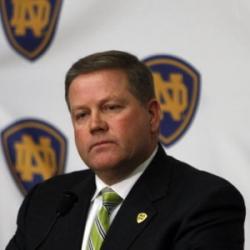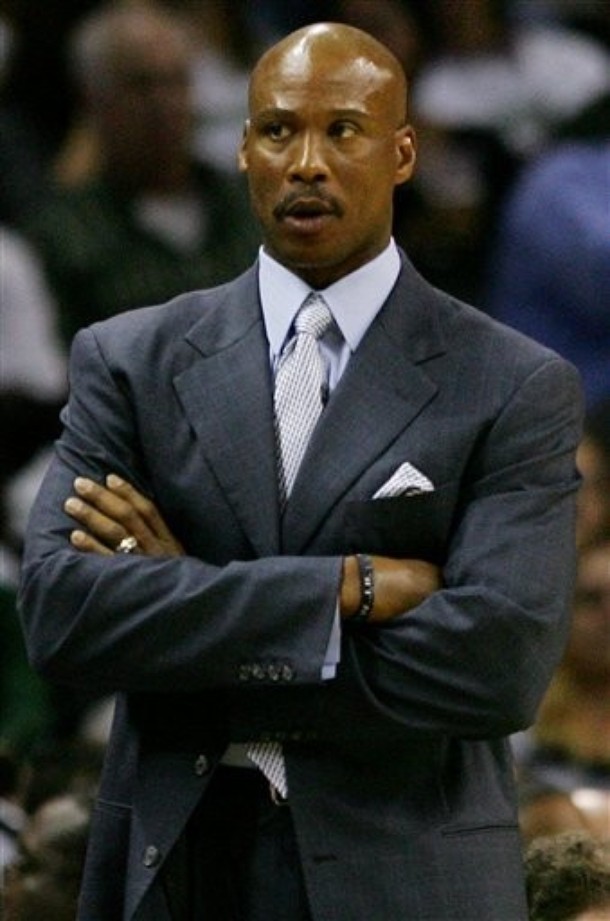 Browns Archive
Browns Archive  Lingering Items--Clueless Edition
Lingering Items--Clueless Edition
I t's hard to know exactly what to call the NFL "situation" at the moment. The players and their union walked away from the bargaining table last Friday at 4 p.m. so that their lawyers could decertify the NFLPA as a union and then a handful of players could turn around and sue their employers for anti-trust violations. On the heels of those activities came the NFL owners' move to then lock them out, although since there is no union it's really unclear what a lockout could actually mean in practical terms.
t's hard to know exactly what to call the NFL "situation" at the moment. The players and their union walked away from the bargaining table last Friday at 4 p.m. so that their lawyers could decertify the NFLPA as a union and then a handful of players could turn around and sue their employers for anti-trust violations. On the heels of those activities came the NFL owners' move to then lock them out, although since there is no union it's really unclear what a lockout could actually mean in practical terms.
Nonetheless, this hasn't and won't stop the inevitable public relations war over the hearts and minds of the fans, as if swaying the fans one way or the other will help determine the outcome of this dispute.
To the owners' credit, they aren't much acting like the fans view of this matters all that much. In that they're just being honest. To the owners, this is a high stakes game that will in large part determine the value of the multi-million dollar investment they call a football franchise. Sure the revenues getting split up are provided directly and indirectly by the fans, but they know that alienating the customer base in an industry like this isn't all that relevant of a concern. The fans will return when football resumes. They always do.
The players, on the other hand, seem to think that influencing fans will make a difference. If you're a fan of Twitter and have any inclination whatsoever to follow the literally hundreds of pro football players with Twitter accounts, you'll see an amazing consistency in their recent messages: "fans, we feel your pain."
There is almost no scenario where the players will ever feel the fans' pain. The disconnect between those who play our professional sports and the people that watch them has never been greater than it is now. It's not just the money players make, though that's a big part of it. It's also the way players conduct their lives. Everything about what most of them do away from the field is designed to keep the barrier between them and the public impenetrable.
But to further the myth anyway, there was Drew Brees, a nice guy, a good quarterback but a clueless businessman, taking an unfortunate and ill-informed shot at the owners' last offer. He claimed it was all for show, whatever that means.
In truth, the owners presented a very comprehensive, very serious offer to the players. Maybe it wasn't acceptable because it still involved givebacks on revenues, but to essentially call it meaningless isn't helpful, particularly when the union hasn't yet produced for public consumption any of the proposals they've made.
There's actually a reason for this. The union hasn't made a single serious proposal throughout the negotiations. All they've done is respond to what the owners have proposed with a loud and resounding "no" each and every time. They've shown little interest in solving the problems presented but great interest in sounding like they are being abused in the process.
What's really stopping these two sides from solving their problems is that they can't even agree there's a problem to solve. The players only want the gravy train to continue unabated. The owners, who actually are the businessmen in the room, see a future where the train has a little less gravy. Until the union accepts the fact that the owners believe there is a problem to solve, the standoff will continue and no amount of quips or tweets or ill-informed opinions by players like Brees is going to change that.
It may be that the owners were spoiling for a lockout all along. But the way the union negotiated with them, it's pretty clear that they also got what they wanted, a chance to litigate in what is surely a dead-end strategy.
**
 There was a letter to the editor in Wednesday's Akron Beacon Journal that essentially called Ohio State football coach Jim Tressel the "shame of Ohio." Well, if his misdeeds are the worst shame visited upon Ohio, then we're in pretty good shape. But I've taken a look at the budget deficit in Ohio and the proposed method of solving it and I'm pretty sure that's not the case.
There was a letter to the editor in Wednesday's Akron Beacon Journal that essentially called Ohio State football coach Jim Tressel the "shame of Ohio." Well, if his misdeeds are the worst shame visited upon Ohio, then we're in pretty good shape. But I've taken a look at the budget deficit in Ohio and the proposed method of solving it and I'm pretty sure that's not the case.
On the day that letter appeared also came the story that the Indiana Department of Labor had concluded their investigation into the death of Notre Dame student Declan Sullivan, who was sent atop a hydraulic lift in winds gusting up to 60 miles per hour last October by Notre Dame football coach Brian Kelly to film practice, only to have that lift tumble over and crush him.
The Indiana Department of Labor concluded that "the evidence overwhelming demonstrated that the university made a decision to utilize its scissor lifts in known adverse weather conditions." For that Notre Dame was given a "knowing" citation and fined a mere $77,500, or about $172,500 less than Ohio State fined Tressel for not being forthcoming about a couple of emails.
What's most telling about the Notre Dame situation is that this knowing violation didn't just occur on Kelly's watch, it occurred with his direct involvement. Kelly knew the weather was bad. Kelly allowed the student to ascend on that lift anyway and Kelly didn't order him back down, despite the worsening weather.
In fact, the weather that particular day last October was severe over a very wide swath, including Columbus, Ohio. Tressel, the so-called shame of Ohio, confronted that same situation on that same day. Responding generally to a question about the severe weather (and before anyone knew of Sullivan's death) Tressel told the media that he purposely didn't ask his student videographers to use the hydraulic lift that day because it was far too windy. Indeed, he talked about how he worried about their safety. Shameful, I know.
Declan Sullivan lost his life because Kelly didn't harbor those same concerns. And for that, no one, but no one, is calling for Kelly's dismissal or calling him the shame of Indiana or South Bend or even just Notre Dame.
The point, I think, is not so much that Kelly is a bad guy because he isn't. He's a decent and honorable man, like Tressel. But the consequence of his inaction on that day cost a student his life. The consequence of Tressel's inaction, at best, was the delay in an investigation over whether a couple of star players traded body art for pieces of memorabilia that they owned.
See, this is what happens when we knee-jerk our reactions to situations that are more complicated than can fit into the scroll at the bottom of ESPN. Perspective is lost and easy answers are demanded. But the easy answers aren't always the right answers. I'm not suggesting that Notre Dame should fire Kelly but if there's a coach that should be, he sure would be a more viable candidate than Tressel.
**
 Speaking of items in the local newspaper, you had to really admire Cleveland Cavaliers head coach Byron Scott's public trashing of his team following practice on Tuesday. Essentially Scott questioned their commitment and their heart. The story didn't get much play because Scott has been saying the same things all season.
Speaking of items in the local newspaper, you had to really admire Cleveland Cavaliers head coach Byron Scott's public trashing of his team following practice on Tuesday. Essentially Scott questioned their commitment and their heart. The story didn't get much play because Scott has been saying the same things all season.
The fascinating angle to all of this is not Scott's candor but the fact that Scott sees nothing wrong with essentially admitting that his players have all but tuned him out.
Generally speaking when the players stop listening to the coach it's time to fire the coach. It's a little too early in Scott's tenure to run down that rabbit hole, but it's not too early to suggest that the problem lies more with Scott than the ragged group of players that the Cavs currently have on the roster.
Scott's right that professional basketball players need to take their jobs seriously. They need to come to work every day prepared to give their best efforts and they need to approach each game with a winner's attitude. But if the players on this team are lacking any of those qualities at the moment it's not because they never had them. It's because they see the situation as hopeless.
Part of that is the lousy roster. Part of that is the lousy coach.
Scott can continue to try and berate his charges into compliance but there's no reason to think that saying these same things in the same way is going to have any different effect. Getting better players will help, but even then questions about Scott's own leadership need to be answered.
I know that fans like a passionate coach, someone willing to get in the face of a player and tell him when he's screwing up. Fans like that because they see that in the movies and it seems to work when someone is writing the script.
But truthfully it doesn't work any better on the basketball court then it does in any other workplace. Employees don't appreciate being berated in private let alone in public. It has everything to do with knowing that the coach doesn't have their backs. Say what you will about former Indians manager Eric Wedge or former Browns head coaches Romeo Crennel or Eric Mangini, but one thing none of them ever did was call out a player or the team like that publicly. Not once.
This is a lesson that Scott hasn't yet learned, despite all his travels. Indeed, maybe that's why he's had so many travels in the first place and why Cleveland will likely just be another quick stop on his long journey to nowhere.
**
With the NCAA tournament starting this week, does it make you nervous, karma-wise, that LeBron James picked Ohio State to win the national championship?
- NBA Announces 2013-2014 Schedule
- Browns Ink Sharknado
- Sharknado A No-Show For Rookie Camp
- Trent Richardson Out Until Training Camp
- Browns Sign Brandon Jackson
- Carrasco Suspended Eight Games
- Browns Add to Wide Receiver Depth with David Nelson
- Browns Need to Learn from Past Draft Mistakes
- Browns Release Chris Gocong and Usama Young
- Browns Missing on Grimes Disappointing, But Not The End
The TCF Forums
- Movies coming out
rebelwithoutaclue (Tuesday, January 21 2014 12:56 PM) - 2015 Recruiting
jclvd_23 (Tuesday, January 21 2014 12:38 PM) - The 2014 Offseason Thread
Larvell Blanks (Tuesday, January 21 2014 12:25 PM) - Official- Browns Coach Search/Rumors
Larvell Blanks (Tuesday, January 21 2014 11:53 AM) - Chris Grant's first 3 drafts
Kingpin74 (Tuesday, January 21 2014 10:13 AM) - Mike Brown
YahooFanChicago (Monday, January 20 2014 11:15 PM) - 2014 Hoops Hockey Hijinx
jpd1224 (Monday, January 20 2014 4:44 PM) - 2014 Recruiting
jclvd_23 (Monday, January 20 2014 2:26 PM) - Wish List - #4 Pick
Hikohadon (Monday, January 20 2014 1:26 PM) - #1 overall pick Anthony Bennett
TouchEmAllTime (Sunday, January 19 2014 1:28 PM)


